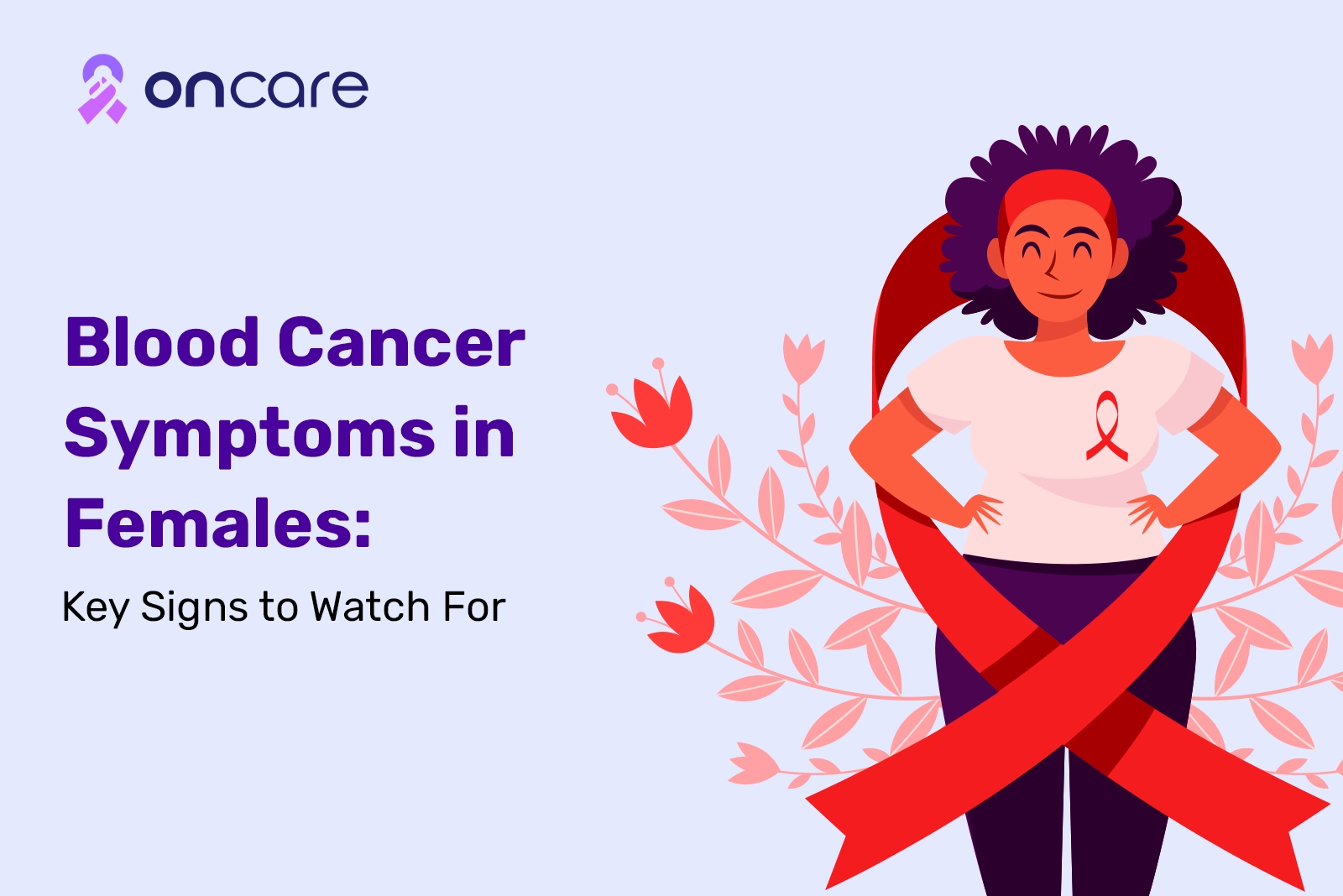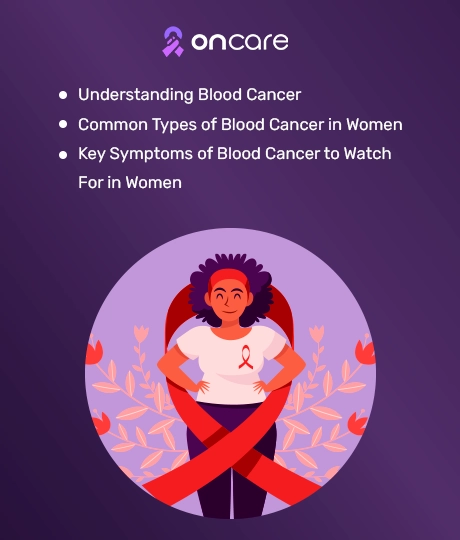Blood Cancer Symptoms in Females: Key Signs to Watch For

Blood cancer affects the production and function of blood cells, which originate in the bone marrow or lymphatic system. In females, symptoms can sometimes be overlooked or mistaken for common health issues, leading to delayed diagnosis. Early signs like persistent fatigue, frequent infections, unusual bruising, and unexplained weight loss should not be ignored. Recognizing these symptoms early can significantly impact timely medical intervention and treatment success. At Oncare, our oncologists focus on diagnosing and treating blood cancers in women, ensuring personalized care and effective treatment plans. If you or your loved one experience persistent symptoms, consult us today and take charge of your health.
Understanding Blood Cancer
Blood cancer in women begins with genetic mutations that cause abnormal blood cells to grow uncontrollably, often in the bone marrow or lymphatic system. These mutations may result from hereditary factors, radiation exposure, chemical exposure (like benzene), viral infections (such as Epstein-Barr virus), or immune system disorders.
As cancerous cells multiply, they interfere with the production of red blood cells, white blood cells, and platelets. A decline in red blood cells causes anemia, leading to fatigue, while a decrease in healthy white blood cells weakens the immune system, making infections more frequent. Low platelet levels disrupt clotting, increasing the risk of excessive bleeding and bruising.
The three main types—leukemia, lymphoma, and multiple myeloma—can spread to organs like the spleen, liver, and bones, causing severe complications. Early detection through blood tests and medical checkups is crucial for timely treatment, which may include chemotherapy, immunotherapy, or bone marrow transplants.
At Oncare, we help diagnose and manage blood cancer in women with advanced screening, personalized treatment plans, and expert care. Oncare provides comprehensive support to help women navigate their journey to better health.

Common Types of Blood Cancer in Women
The three most common types of blood cancer noticed in women are:
Leukemia
Leukemia originates in the bone marrow, where mutations in the hematopoietic stem cells cause uncontrolled proliferation of abnormal white blood cells. These defective cells fail to function properly, crowding out healthy blood cells and impairing immunity. Over time, this disrupts oxygen transport, clotting, and infection defense. Depending on the type, leukemia can be acute (fast-growing) or chronic (slow-progressing), affecting different stages of blood cell development.
Lymphoma
Lymphoma arises in the lymphatic system when lymphocytes (white blood cells) undergo genetic mutations, leading to unchecked growth and accumulation in lymph nodes, spleen, or bone marrow. This disrupts normal immune function and can cause tumor formation. Hodgkin lymphoma involves the presence of Reed-Sternberg cells, whereas non-Hodgkin lymphoma consists of various lymphocyte subtypes. As the disease progresses, cancerous lymphocytes invade vital organs, impairing immune responses.
Multiple Myeloma
Multiple myeloma originates in plasma cells, a type of white blood cell responsible for producing antibodies. Malignant plasma cells multiply uncontrollably in the bone marrow, releasing excessive monoclonal proteins (M-proteins) that interfere with normal blood production. This weakens bones by triggering osteoclast activation, leading to bone resorption and increased fracture risk. Additionally, high M-protein levels impair kidney function and disrupt calcium balance, causing systemic complications.
Key Symptoms of Blood Cancer to Watch For in Women
Blood cancer symptoms often develop gradually and may be mistaken for common health issues. However, persistent or worsening symptoms should not be ignored. Here are some key warning signs that may indicate an underlying blood disorder:
Unexplained Fatigue
Constant tiredness in women that does not improve with rest may be due to anemia, a condition where blood cancer reduces healthy red blood cells. This leads to decreased oxygen circulation, causing weakness, dizziness, and low energy levels. Women often dismiss fatigue as stress or hormonal changes, but prolonged exhaustion without a clear cause should be taken seriously. If fatigue is affecting daily life, a medical evaluation is necessary.
Unusual Bruising or Bleeding
Blood cancer affects platelet production, leading to frequent nosebleeds, bleeding gums, or heavy menstrual periods. Women may also notice easy bruising or prolonged bleeding from minor cuts, indicating a problem with blood clotting. If bruises appear in unusual areas or without injury, it could signal an underlying issue. Any unexplained bleeding in women should be reported to a doctor for further investigation.
Swollen Lymph Nodes
Painless neck, underarms, or groin swelling can be a sign of lymphoma or leukemia in females. Lymph nodes help fight infections, but when cancerous cells multiply, they cause persistent swelling. Infections can also temporarily enlarge lymph nodes, but if the swelling lasts for weeks or grows more significant, it may indicate a more serious condition. A thorough medical evaluation at Oncare, including blood tests or imaging, can help determine the cause in women.
Unexplained Weight Loss
Losing a significant amount of weight without changes in diet or activity levels can be a sign of cancer. Blood cancer affects metabolism and can cause loss of appetite, leading to rapid weight loss over a short period. While weight fluctuations are expected in women, losing more than 10% of body weight within 6 months, especially without trying, should raise concerns. Females should keep a check if other symptoms like night sweats or weakness may accompany this sign.
Bone Pain and Joint Discomfort
Blood cancer affects bone marrow, leading to deep-seated bone pain, particularly in the back, ribs, or legs in women. This pain may worsen over time and is often more noticeable at night or during movement. Unlike general muscle aches, this pain is persistent and does not improve with rest or pain relievers. If joint discomfort is affecting mobility, women should seek medical guidance right away.
Night Sweats and Fever
Persistent fevers and excessive night sweating, even in a calm environment, can be warning signs of blood cancer in women, often indicating an immune system malfunction. Many women dismiss these symptoms as hormonal changes or menopause, but recurring fevers without an apparent infection, accompanied by chills or fatigue, should not be ignored. Night sweats that drench clothing or disrupt sleep are particularly common in lymphoma, affecting women of all ages. If you’re experiencing these symptoms, don’t wait—Oncare is here to support you with compassionate, expert care for blood cancer detection and treatment.
Shortness of Breath and Pale Skin
A shortage of red blood cells can lead to anemia, causing breathlessness, dizziness, and pale skin. Even mild exertion may leave a person feeling winded. Women may notice their skin appearing paler than usual, especially on the face, lips, or nails. Anemia-related shortness of breath may also cause heart palpitations, making daily activities more difficult. If these signs persist, medical testing is necessary.
Abdominal Discomfort or Fullness
Blood cancer can cause the spleen or liver to enlarge, leading to persistent bloating, a feeling of fullness even after small meals, or mild pain in the left upper abdomen. Many women may dismiss these symptoms as common digestive issues like gas, acidity, or hormonal changes, delaying early diagnosis. However, if bloating is persistent, occurs without dietary triggers, or is accompanied by fatigue and unexplained weight loss, it could indicate underlying blood cancer
Heavy or Irregular Menstrual Bleeding
Women with blood cancer may experience abnormally heavy or prolonged periods due to low platelet levels. This can also lead to clotting issues, making menstrual cycles unpredictable or excessively long. Some may also notice increased spotting between periods or a sudden change in flow patterns. If menstrual changes are accompanied by fatigue or bruising, it may indicate a blood-related disorder.
Increased Risk of Urinary Tract Infections (UTIs)
Women with blood cancer are more prone to frequent or recurrent UTIs due to a weakened immune system. This immune dysfunction makes it harder for the body to fight infections, increasing the likelihood of burning during urination, lower abdominal pain, and frequent urges to urinate. Unlike typical UTIs, those linked to blood cancer may not respond well to antibiotics or may return soon after treatment. With a team of expert oncologists, Oncare uses advanced diagnostic tools to detect and manage blood cancer in women, ensuring personalized care and the best possible health outcomes.
Conclusion
Blood cancer symptoms in women can often be subtle and mistaken for common health issues, leading to delayed diagnosis. Whether you experience unexplained fatigue, frequent infections, abnormal bruising, or significant weight loss, seeking timely medical attention can make a critical difference. Early detection facilitates effective treatment and better outcomes.
At Oncare, we are committed to providing comprehensive screening, personalized treatment plans, and expert oncological care to support women at every stage of their journey. With high-tech diagnostic tools, advanced therapies, and a compassionate team, we ensure that every woman gets the best possible care for blood cancer. Visit us today for expert evaluation and tailored treatments to improve your well-being and quality of life.